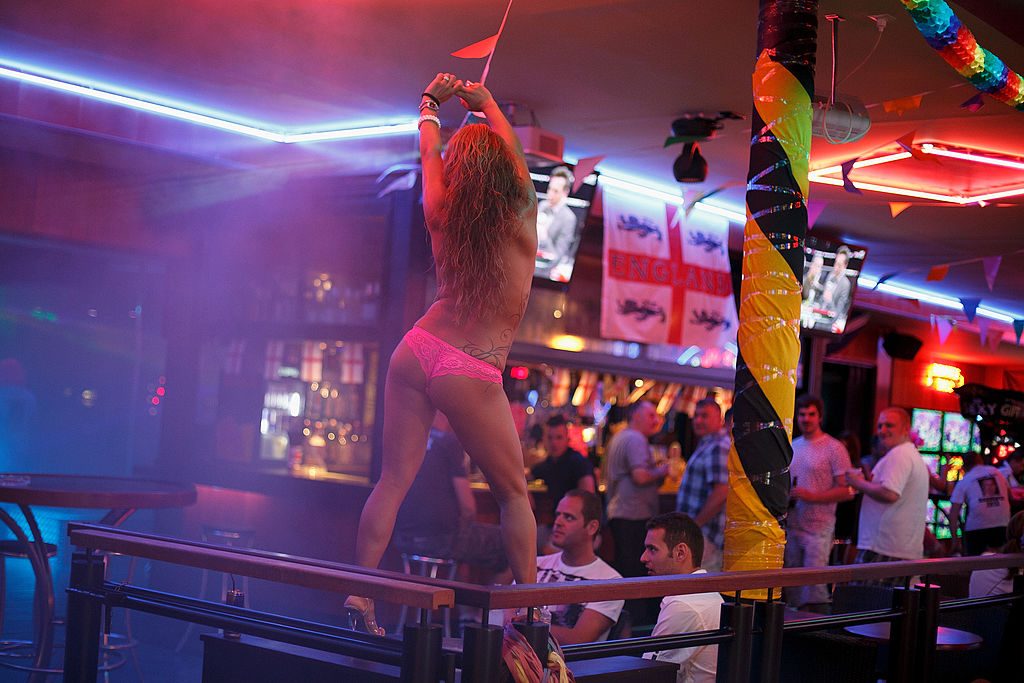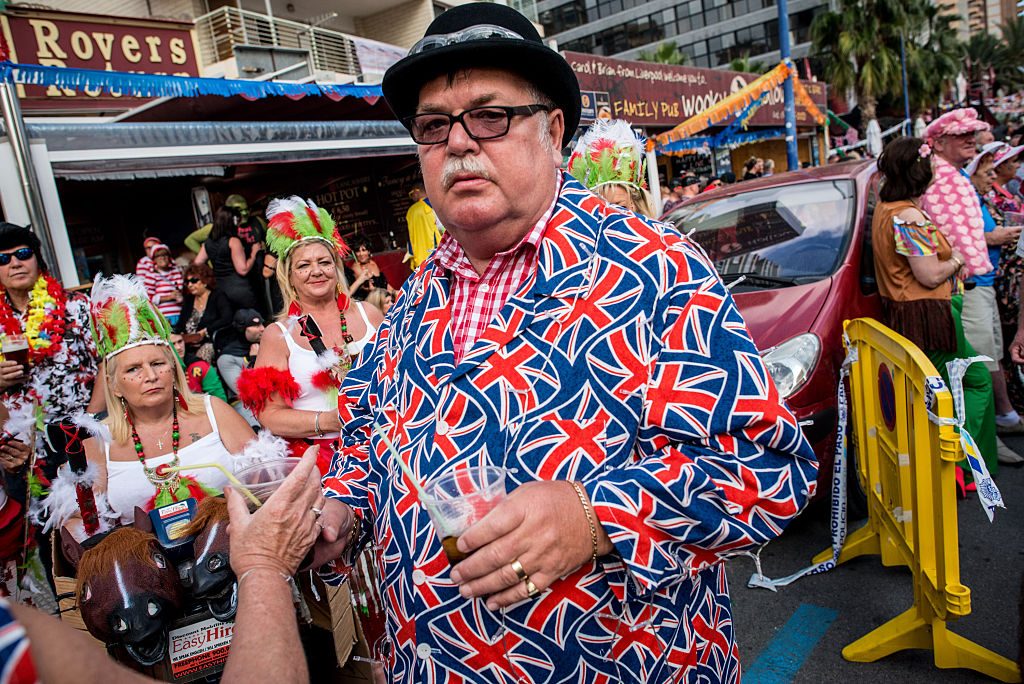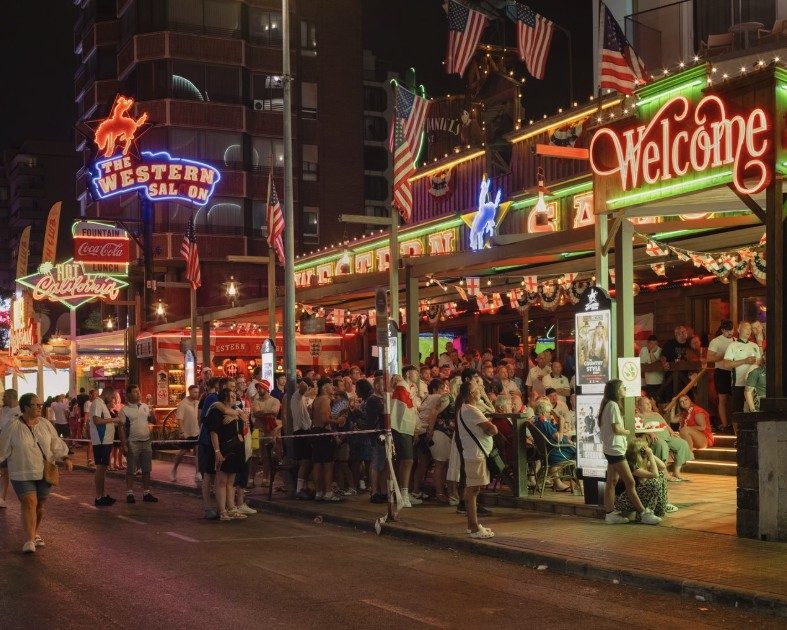It’s a balmy July evening in Benidorm, and a husband-to-be sits on a mechanical bull in the outside area of Broadway Cabaret. As the bull starts bucking, a blonde stripper — cash pinched to her thigh by a convoluted thong — jumps on behind him. She lifts up his white t-shirt and lashes his spotty back with two leather belts. His friends video it, and some 20 people watch from the street. “He doesn’t seem to be enjoying it,” says the man to my left, perplexed.
Welcome to the Calle Gerona (to the English, just “The Strip”), which has become the destination of choice for British lads trips and stag dos. Earlier I walked past several men lumbering drunkenly along the street, dressed in black t-shirts reading “DAVE THE C**T’S 40TH” with photos of Dave in varying states of inebriation and undress below. At 20-metre intervals, dealers flog “da gear”, or else are propositioned by pale, topless lads, fresh off the plane at Alicante, conspicuously exchanging wads of cash.
In their 1976 book, The Golden Hordes, John Ash and Louis Turner theorised that “motivated by the desire to escape from his home society, the tourist soon imposes its values on the society he is visiting”. But The Strip is less an imposition than a simulacrum of Britain, where the bars have vacuously patriotic names like The Rose and Crown, The Red Lion, and The Queen’s Arms, and are decorated with booze-drenched, faux-leather stools, snooker tables, and monolithic screens showing Sky Sports, RacingTV, and GB News. Even British sectarianism has come here, albeit as a racist, drunken charade: on 13 July some 500 people attended an Orange Day parade, where racial slurs were hurled at the mostly Indian and Pakistani shopkeepers.

This is the Benidorm of popular derision; a resort sneered at for its stereotyped horde of boozed and sunburnt Brits, who — the idiots! — voted Brexit, despite literally visiting Spain once a year, where their only nod to the local culture is a reluctant pint of Estrella and a cursory glance at the fried calamari, before choosing fish and chips instead. “Benidorm is like England, little England,” says Jez, a goateed 55-year-old with a West Country accent, who works on The Strip. “People say they’re going to Spain. They’re not. They’re going to Benidorm.” Still, Jez loves it: he earns €1,500 a month plus tips, and lives in a five-bedroom villa with a swimming pool. He’s been in Benidorm for 34 years and prefers it to the actual England, “that shitty place”, where the weather’s bad and the costs of booze and living are extortionate.
In Julian Barnes’s 1998 novel, England, England, a businessman creates a theme park on the Isle of Wight that replicates England for tourists. It is “everything you imagined England to be, but more convenient, cleaner, friendlier, and more efficient”. That twee replica hosts the best of England (the Houses of Parliament, Stonehenge, Old Trafford, and even the Royal Family) without any of the contradictions, nuance, and grievances that make England, well, England. Benidorm is the inverse of that, catered to the British tourist; instead of denying the national id, it flatters it with affordability, permissiveness, and familiarity. It asks of British tourists only their presence and their money, and in return offers a fantasy version of Britain that will take their desires seriously.
“Benidorm is like England, little England”
That’s why it attracts the pathological disgust of haughty, metropolitan Britons. “They’re from a different species,” says out-of-touch cabinet minister Hugh Abbot in the BBC’s The Thick of It when confronted with actual people; that is the gaze most often cast on Benidorm. “Busy beaches and British food,” the photographer Rob Ball tells me, “are not everyone’s idea of an ideal holiday. But for some, including many working families, it’s exactly what they want to do with their limited holiday allowance each year.”
There is no sneering of tourists within Benidorm, only warmth and welcoming. “I went to Benidorm with an open mind and found a place full of warmth,” says Ball. “It was infectious to be surrounded by people enjoying themselves.” As the seatbelt sign switched off on his flight from Leeds-Bradford to Alicante, passengers perambulated the aisle, exchanging hotels, anecdotes, recommendations, and phone numbers. Ball, who spent a year photographing the city, captures this joviality in his latest photography book, Benidorm. One image shows the Western Salon filled with England fans watching the Euros on TV, the walls draped with neon-lit St George’s flags. Hands on their heads, or around each other’s shoulders, a community hastily forms among this transient crowd, cheering on the national team. “Nothing annoys some tourists more than the presence of other tourists,” write Ash and Turner, but in Benidorm the opposite is true.

So far, Spain’s widespread anti-tourism protests have been absent here. It’s not these Brits, happily sequestered on the Costa Blanca, who are being ambushed by Spaniards with water pistols and told to “Go Home!” Instead, it’s the church-ponderers, with their penchants for authentic city centre apartments, that have caused a dearth of rental accommodation in cities like Barcelona. “Your AirBnB used to be my home,” shouted last summer’s protesters. But in Benidorm, there would be no homes without the hotels. “In this town,” says Tracy, who runs the travel website Benidorm Seriously, “almost everyone depends on tourism.”
The only thing that ever happened in Benidorm before tourism was fishing. Its fishermen were masters of the almadraba, an ancient Phoenician tuna-fishing technique, by which a complex maze of nets trap bluefin tuna as they swim from the Atlantic into the Mediterranean — a practice that was obsolete by the 20th century. By 1950, there were only a handful of hotels, catered to Spanish tourists, and no running water. But that year, a new mayor was elected: the enterprising Pedro Zaragoza.
That same year, Vladimir Raitz, co-founder of Horizon Holiday Group, took the first airborne package holidaymakers to Corsica for a week of sunbathing. Soon, everyone in Britain would want what Ash and Turner call “the four S’s” (sun, sand, sea, and sex) as an annual reward for their toil. Foreseeing this, Zaragoza wanted to capitalise on the leisure revolution, but there was a problem: ever since its invention in 1946, the bikini had been considered a moral danger by the Catholic Church, and was prohibited by local authorities in many parts of Francoist Spain, including Benidorm’s Alicante Province. No bikinis meant no foreign tourists, and so Zaragoza swapped the morality of Spain for that of Northern Europe, signing a municipal order in 1951 that allowed them to be worn on the beach.
Threatened with excommunication by the Archbishop of Valencia, Zaragoza arranged an audience with General Franco: he woke up at 4am, stuffed newspaper down his shirt to keep warm, and drove his little green vespa for eight hours until he reached Franco’s palace in Madrid, where he earned El Caudillo’s support. (He would later become Franco’s Director-General of Tourism.) A large cross was placed on the Sierra Helada, overlooking Levante Beach, by local friars atoning for the town’s sins. Father Aparicio Pellin didn’t think this went far enough: “Oh! If they erected a black cross on the beach for every mortal sin committed there, the beach would have more crosses than grains of sand.”
“Without the bikini,” Giles Tremlett writes in Ghosts of Spain, “there, quite possibly, would be no modern Benidorm.” Nor would there be a recognisable modern Spain — a colossus of tourism, where the industry accounts for 15% of GDP. There are now some 43,600 hotel beds in Benidorm and more high-rises per capita than any town in the world — thus its nickname, BeniYork.

In the late Fifties, the British arrived in Benidorm. (In 1956, Ted Hughes and Sylvia Plath honeymooned there, a trip which his poem, “You Hated Spain”, uses to illustrate their incompatibility: “Spain frightened you. / Spain. Where I felt at home.”) But it was only after Alicante airport opened in 1967 that tourists from Northern Europe came en masse: by 1977, it hosted 12 million visitors, more than it ever has since.
As Benidorm boomed, the inexorable decline of the British seaside began. But the spirit of towns like Clacton and Skegness, Eastbourne and Southend, lives on here — most notably in the presence of variety shows and tribute acts. “Cabaret died in the UK 30 years ago,” says Derek, a cabaret singer from Northern Ireland. “But it’s still going in Benidorm.” He wears aviators, a short-sleeve green shirt, and a fedora. He moved here 15 years ago because there was little work in Belfast, and was soon performing 22 shows a week, such as “The Blues Brothers Experience” and a Joe Dolan tribute.
“People come, firstly, for the sun; secondly, the cheap booze; and thirdly for the entertainment,” says Tracy, who says that her online “What’s On” guide had around two million hits last year. She tells me how, as well as cabaret, bingo is crucial to Benidorm’s entertainment scene. The problem is that the Brits dislike the licensed bingo halls. “The main reason the British don’t go to them is that the numbers are called in Spanish, and very fast,” she says. Illegal bingo is often advertised as “housey-housey” (its archaic, British name) and people have been arrested for playing it. She knows of one bar whose bouncers used to have a panic button which they would press if the police were coming. A light then flashed, and everyone would hide their bingo tickets.
A few blocks away from The Strip, Gary Lee James does an Elvis tribute at Sinatra’s Bar. “Is this your first time as an audience?” he asks the quiescent crowd in wobbly American. But once he sings “Sweet Caroline”, the audience is his: they wave their hands, clap, and shout “duh-duh-duh” with customary obeisance. James moves like the late Elvis, overcoming all his barbiturated physicality to get through another night in Vegas. He crunches a bottle of water between the songs. “This isn’t my real accent,” he says. “This is. I’m from Coventry.”
“He’s the best Elvis impersonator in Benidorm,” says Jamie*, an elderly Scouser. “Costs a hundred quid to see him at the [Benidorm] Palace. You’re lucky.” But that’s not why Jamie and his wife turned up tonight. “We’re here for Benidorm Tom,” he says, a Tom Jones tribute playing later. Every year Jamie and his wife spend July and August here. Why? “Because we love the entertainment.”
“I’ve always said that Benidorm should have been Europe’s Las Vegas,” says Derek wistfully, but that was never to be. Less than a city of angels, Benidorm is a tribute town; not just to Elvis and Tom Jones, but to the country its British patrons left at home. Here there’s no B-sides, no disappointments, no taking-yourself-too-seriously; there’s only the hits, the crowd-pleasers, and the warmth of the sun.

















